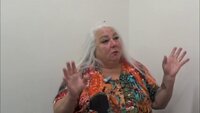| Title |
Kidman, Brenda OH19_051 |
| Creator |
Weber State University, Stewart Library: Oral History Program. |
| Contributors |
Kidman, Brenda, Interviewee; McClellan, Kacey Interviewer; Storey, Sarah, Video Technician |
| Description |
The Beyond Suffrage Project was initiated to examine the impact women have had on northern Utah. Weber State University explored and documented women past and present who have influenced the history of the community, the development of education, and are bringing the area forward for the next generation. The project looked at how the 19th Amendment gave women a voice and representation, and was the catalyst for the way women became involved in the progress of the local area. The project examines the 50 years (1870-1920) before the amendment, the decades to follow and how women are making history today. |
| Abstract |
The following is an oral history interview with Brenda Kidman, conducted on May 24, 2019 at Weber State University, by Kacey McClellan. Brenda discusses her life and the impact of the 19th Amendment. Sarah Storey, the video technician, is also present during this interview. ; The following is a video clip of an oral history interview with Brenda Kidman conducted on May 24, 2019. In this video clip, Brenda discusses the female voter organization that she belongs to. |
| Image Captions |
Brenda Kidman (Left) & Elizabeth Warren (Right) Circa 2018; Brenda Kidman Circa 2019; Brenda Kidman speaking about a female voter organization celebrating the 19th Amendment. |
| Subject |
Women--suffrage; Voting--United States; Women--Rights of women |
| Keywords |
Female leaders; 19th Amendment; Voting rights |
| Digital Publisher |
Stewart Library, Weber State University, Ogden, Utah, United States of America |
| Date |
2019 |
| Date Digital |
2019 |
| Temporal Coverage |
1961; 1962; 1963; 1964; 1965; 1966; 1967; 1968; 1969; 1970; 1971; 1972; 1973; 1974; 1975; 1976; 1977; 1978; 1979; 1980; 1981; 1982; 1983; 1984; 1985; 1986; 1987; 1988; 1989; 1990; 1991; 1992; 1993; 1994; 1995; 1996; 1997; 1998; 1999; 2000; 2001; 2002; 2003; 2004; 2005; 2006; 2007; 2008; 2009; 2010; 2011; 2012; 2013; 2014; 2015; 2016; 2017; 2018; 2019 |
| Medium |
oral histories (literary genre) |
| Spatial Coverage |
Maryland, Maryland, United States, http://sws.geonames.org/4361885, 39.00039, -76.74997; Arlington, Tarrant, Texas, United States, http://sws.geonames.org/4671240, 32.73569, -97.10807; North Carolina, North Carolina, United States, http://sws.geonames.org/4482348, 35.50069, -80.00032; South Carolina, South Carolina, United States, http://sws.geonames.org/4597040, 34.00043, -81.00009; California, California, United States, http://sws.geonames.org/5332921, 37.25022, -119.75126 |
| Type |
Text; Image/StillImage; Image/MovingImage |
| Access Extent |
24 page PDF; Video clip is an mp4 file, 77.6 MB |
| Conversion Specifications |
Filmed using a Sony HDR-CX430V digital video camera. Sound was recorded with a Sony ECM-AW3(T) bluetooth microphone. Transcribed using Express Scribe Transcription Software Pro 6.10 Copyright NCH Software. |
| Language |
eng |
| Rights |
Materials may be used for non-profit and educational purposes, please credit University Archives; Weber State University; Music for video clips was provided by uppbeat.io, https://uppbeat.io/t/simon-folwar/hope; License code KYI5VLB63GF1TXND; Music for video clips was provided by uppbeat.io, https://uppbeat.io/t/yeti-music/gentle-breeze; License code IWGKRYG7XHQOMZY0 |
| Source |
Kidman, Brenda OH19_051 Weber State University Archives |
| Format |
application/pdf; video/mp4 |
| ARK |
ark:/87278/s6ch19gm |
| Setname |
wsu_bs_oh |
| ID |
105459 |
| Reference URL |
https://digital.weber.edu/ark:/87278/s6ch19gm |
| Title |
Kidman, Brenda OH19_051 |
| Creator |
Weber State University, Stewart Library: Oral History Program. |
| Contributors |
Kidman, Brenda, Interviewee; McClellan, Kacey Interviewer; Storey, Sarah, Video Technician |
| Description |
The Beyond Suffrage Project was initiated to examine the impact women have had on northern Utah. Weber State University explored and documented women past and present who have influenced the history of the community, the development of education, and are bringing the area forward for the next generation. The project looked at how the 19th Amendment gave women a voice and representation, and was the catalyst for the way women became involved in the progress of the local area. The project examines the 50 years (1870-1920) before the amendment, the decades to follow and how women are making history today. |
| Abstract |
The following is an oral history interview with Brenda Kidman, conducted on May 24, 2019 at Weber State University, by Kacey McClellan. Brenda discusses her life and the impact of the 19th Amendment. Sarah Storey, the video technician, is also present during this interview. |
| Image Captions |
Brenda Kidman (Left) & Elizabeth Warren (Right) Circa 2018; Brenda Kidman Circa 2019 |
| Subject |
Women--suffrage; Voting--United States; Women--Rights of women |
| Keywords |
Female leaders; 19th Amendment; Voting rights |
| Digital Publisher |
Stewart Library, Weber State University, Ogden, Utah, United States of America |
| Date Digital |
2019 |
| Temporal Coverage |
1961; 1962; 1963; 1964; 1965; 1966; 1967; 1968; 1969; 1970; 1971; 1972; 1973; 1974; 1975; 1976; 1977; 1978; 1979; 1980; 1981; 1982; 1983; 1984; 1985; 1986; 1987; 1988; 1989; 1990; 1991; 1992; 1993; 1994; 1995; 1996; 1997; 1998; 1999; 2000; 2001; 2002; 2003; 2004; 2005; 2006; 2007; 2008; 2009; 2010; 2011; 2012; 2013; 2014; 2015; 2016; 2017; 2018; 2019 |
| Medium |
oral histories (literary genre) |
| Spatial Coverage |
Maryland, Maryland, United States, http://sws.geonames.org/4361885, 39.00039, -76.74997; Arlington, Tarrant, Texas, United States, http://sws.geonames.org/4671240, 32.73569, -97.10807; North Carolina, North Carolina, United States, http://sws.geonames.org/4482348, 35.50069, -80.00032; South Carolina, South Carolina, United States, http://sws.geonames.org/4597040, 34.00043, -81.00009; California, California, United States, http://sws.geonames.org/5332921, 37.25022, -119.75126 |
| Type |
Text; Image/StillImage |
| Access Extent |
24 page PDF |
| Language |
eng |
| Rights |
Materials may be used for non-profit and educational purposes, please credit University Archives; Weber State University |
| Source |
Kidman, Brenda OH19_051 Weber State University Archives |
| Format |
application/pdf |
| Setname |
wsu_bs_oh |
| ID |
105607 |
| Reference URL |
https://digital.weber.edu/ark:/87278/s6ch19gm/105607 |





